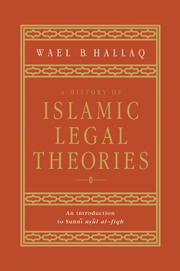5 - Social reality and the response of theory
Published online by Cambridge University Press: 05 October 2013
Summary
INTRODUCTION
in the foregoing chapter, the main variables to be found in the body of legal theory were highlighted with a view to demonstrating the variety of factors that exercised influence in shaping this theory throughout the centuries. In the present chapter I shall expand on the theme of relationships between legal theory as abstracted discourse and the worldly and mundane elements that contributed to the form, substance and direction of this discourse. We shall concentrate on Abū Isḥāq al-Shāṭibīʾs (d. 790/1388) legal theory not only in order to illustrate these significant relationships, but also because his was a theory that represented the culmination of an intellectual development that started as early as the fourth/tenth century. By his time, legal theory had reached such a high level of maturity that it was capable of being entirely remolded – as it indeed was – while maintaining its traditional function of discovering the law and regulating its continual creation and, to some extent, functioning. But the choice of Shāṭibī here has more than meets the eye. While his theory exemplifies a distinctive reaction to a particular worldly and social reality, it has also played an important role in modern legal reform. In this respect, it will be interesting to see, on the one hand, how Shāṭibīʾs theory was understood and put to use by modern legal reformists (the concern of the next and final chapter), and, on the other, the actual historical circumstances that gave rise to it, and which, ultimately, endowed it with its defining characteristics.
- Type
- Chapter
- Information
- A History of Islamic Legal TheoriesAn Introduction to Sunni Usul al-fiqh, pp. 162 - 206Publisher: Cambridge University PressPrint publication year: 1997



